While compiling this list of 50 classical mythology retellings, I found a link connecting many of the modern retellings– a link that will be obvious if you’ve read Margaret Atwood’s Penelopiad or Madeline Miller’s Circe:
“At the very dawn of religion, God was a woman. Do you remember?” from Merlin Stone’s When God Was a Woman.
Modern women are retelling classic tales through the voices of the women who have been lost through translation and misogyny. Translations of ancient texts have mostly been written by men, and although translations are meant to be objective, often, the translators inscribed their own prejudices and politics into the text. For example, Odysseus’ hanged “maids” were no such thing; those women were slaves who were hanged by Telemachus. It is through translation that these women were labelled “maid” and “slut”.
In an article that Emily Wilson (first woman to translate The Odyssey) wrote for The New Yorker she said: “The Odyssey traces deep male fears about female power, and it shows the terrible damage done to women, and perhaps also to men, by the androcentric social structures that keep us silent and constrained.”
It is important that women retake these myths. While translators like Emily Wilson are correcting aspects of misguided translations; authors like Margaret Atwood, Madeline Miller, Emily Hauser, and Pat Barker are retelling the original stories from a female perspective. Helen, Circe, Briseis, Daphne, Penelope, Medusa, Cassandra, all receive fair stories, and through a feminist retelling– redemption.
I don’t want to pretend that any of the characters, male or female, from classic mythology are perfect, but like the story of Adam and Eve, relegating women to whores, damsels, and temptresses can be a damaging trope that seeps into other areas of art and literature.
So I hope with this list you will find a balanced selection of…
50 Classic Mythology Retellings:
Frankenstein; or, the Modern Prometheus by Mary Shelley
Prometheus is the god that has his liver eaten by an eagle everyday. Fun stuff. Prometheus provoked the ire of Zeus when he stole the sacred fire of the gods from Mount Olympus and gave it to mankind. As in, he gave mankind knowledge. Frankenstein was based in part, on the Prometheus- myth.
For Her Dark Skin by Percival Everett
Percival Everett has written over 20 novels, and they’re wonderful (okay, I admit I haven’t read them all, but if I do end up reading them all, I already know that they’ll be wonderful). “For Her Dark Skin” retells the story of Jason and Medea (possibly my favorite Greek myth).
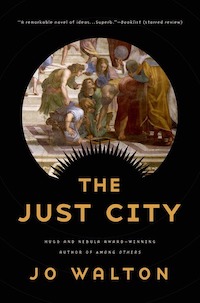 The Just City by Jo Walton
The Just City by Jo Walton
Daphne turns herself into a tree to avoid Apollo’s sexual advances. Apollo, perplexed by Daphne’s demure, decides to try a mortal life to see if he can figure out humanity. As a mortal, he lives in Athene’s Just City. A city populated with thousands of children, and a few hundred adults who serve as educators. It’s a city that exists outside of time, and is populated by people from different points in history.
xo Orpheus: Fifty New Myths by Kate Bernheimer (editor)
A retelling of 50 myths from around the world by 50 different authors; such as, Madeline Miller, Laura van den Berg, Anthony Marra, Joy Williams, Victor LaValle, Elizabeth McCracken (to name a few).
Neverhome by Laird Hunt
Set during the Civil War, Ash leaves her husband and dons a uniform to fight for the Union army. It’s a gender- swapped retelling of the Odyssey.
Galatea by Madeline Miller
So if you decide to read xo Orpheus: Fifty New Myths, this is Madeline Miller’s story in the collection. But if you think Madeline Miller is the queen of retellings, and you only want to read this story– well, here it is!
 House of Names by Colm Toibin
House of Names by Colm Toibin
Before heading out to fight the Trojan War, Agamemnon sacrifices his daughter Iphigenia to make the winds blow in his favor before sailing. Yes, Iphigenia is killed BY HER FATHER, so the WIND will blow in his favor… After reading this book, try A Memory of Wind by Rachel Swirsky. It’s a free Tor short story that retells the myth from Iphigenia’s point of view.
Helen in Egypt by H.D.
H.D., initials for Hilda Doolittle, was a poet at the beginning of the 20th century. This is a book length poem that reimagines the Helen myth. After reading the biography of Edna St. Vincent Millay, I’m obsessed with female poets who were writing at the beginning of the twentieth century (they all seemed to share a love of Sappho).
Frenzy by Percival Everett
Okay, yeah, two Percival Everett books. But I just warned you that I thought he was an American gem. Hugely, underrated. This is a retelling of Dionysos told by his servant Vlepo. Think: Christopher Moore’s Lamb.
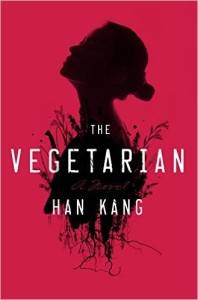 The Vegetarian by Han Kang
The Vegetarian by Han Kang
At first I erased The Vegetarian from the list; because, although I’d been told there was a direct correlation between The Vegetarian and the story of Daphne and Apollo (Daphne turns herself into a tree to escape Apollo’s advances), I thought it was too big a stretch. But I recently read Han Kang’s short story “The Fruit of My Woman”, in which the wife becomes a tree to escape a life that she doesn’t want to live. It was a blueprint for her eventual novel, The Vegetarian, so now the allusions to Daphne feel too real, so I’ve decided to include it. You’ll have to decide if you agree.
Gods and Mortals: Modern Poems on Classical Myths by Nina Kossman
In this collection, Nina Kossman compiled poetry from the twentieth century that retold classic myths from around the world. Featured in this collection are: Auden, Yeats, Wislawa Szymborska, and Rilke– just to name a few.
Cold Mountain by Charles Frazier
By now most of us have either read the book, or seen the movie, but did you know it was a retelling of The Odyssey?
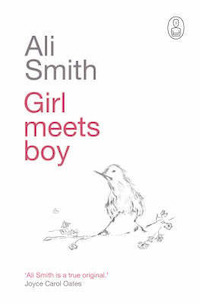 Girl Meets Boy by Ali Smith
Girl Meets Boy by Ali Smith
I feel like Ali Smith has a much greater following in the U.K., but she’s no doubt a master of her craft. This is another selection from the Canongate Myths series that retells the story of Iphis: Iphis is born a girl but is raised as a boy by her mother to protect her from her father. When Iphis is of a marriageable age, her father– still unaware that Iphis is female– finds a young woman (Ianthe) for Iphis to marry. Iphis and Ianthe fall deeply in love, and agree to marry. Iphis’ mother, alarmed, prays to the gods for Iphis to be made a man, and the gods grant her prayers.
The Autobiography of Cassandra, Princess & Prophetess of Troy by Ursule Molinaro
Many women may be able to relate to this story: Cassandra, daughter of King Priam and Queen Hecuba of Troy, receives prophecies from the gods, but no one believes her prophecies. The moral: believe women, because they might be trying to tell you something like “hey, there are Greeks inside that big wooden horse”.
Women and Power by Mary Beard
Beard uses her knowledge of ancient cultures and myths to demonstrate how misogyny has been a big problem throughout history– especially in Homer’s Odyssey.
The Odyssey by Homer (translated by Emily Wilson)
I included Emily Wilson’s translation of The Odyssey on this list because it’s the first time the Odyssey has been translated by a woman. It’s an achievement to celebrate.
 Here, the World Entire by Anwen Kya Hayward
Here, the World Entire by Anwen Kya Hayward
Medusa has been treated very poorly throughout mythology. In Ovid’s recounting, Medusa was raped by Poseidon in Athena’s temple, and Athena, angered by her temples desecration, turned Medusa’s hair into serpents. At the end of the story she’s beheaded by Perseus. A terrible story. Anwen Kya Hayward attempts the give Medusa something better.
Gods Behaving Badly by Marie Phillips
The gods are alive and well in the twenty- first century, but they’re all living together in a London townhouse, and they’ve had to get real jobs. Apollo is a T.V. psychic, Aphrodite is a phone sex operator, and Artemis is a dog walker. What could possibly go wrong?
Weight: The Myth of Atlas and Heracles by Jeanette Winterson
There’s something about the Atlas myth that always resonates– a man with the whole world on his shoulders… This is another book in the Canongate Myths series.
Lavinia by Ursula K. Le Guin
Again, a woman who was not given a voice in the original text– Virgil’s Aeneid— is allowed her own story. Le Guin expands on the story of Lavinia, the beautiful daughter of Latinus and Amata, who marries Aeneas, a hero of the Trojan War.
The King Must Die by Mary Renault
Like Madeline Miller, Mary Renault breathed new life into ancient myths. This is the story of Theseus, the killer of Minotaur, and the abandoner of Ariadne. Some may say he was a jerk, some may say he was a hero, some may say there’s rarely a difference…
Autobiography of Red by Anne Carson
A book you’ll want to highlight and cherish. This is a novel told in verse about a young man, Geryon, who falls in love with Herakles. A story inspired by the legend of Hercules.
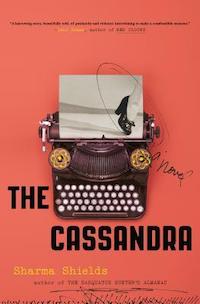 The Cassandra by Sharma Shields
The Cassandra by Sharma Shields
Cassandra, the prophet that tried to warn everyone in Troy that things were about to go to shit, gets reimagined by Sharma Shields. This Cassandra (Mildred) is a secretary at a nuclear facility during WWII. While there, she starts receiving prophetic dreams about the facility and the work they’re doing, which might bring about the end of the world. But guess what?! No one believes her.
Daphne by Will Boast
Daphne, pursued relentlessly by an infatuated Apollo, turns herself into a laurel tree before she can be overtaken by the god. In Will Boast’s retelling, Daphne is a young woman with a rare disease in which she endures paralysis every time she experiences extreme emotion.
The Children of Jocasta by Natalie Haynes
A retelling of the Oedipus myth from a female- centered perspective. A refreshing retelling of a well known story.
The Silence of the Girls by Pat Barker
Likewise, this is a retelling of the Trojan War told from the perspective of the women whose voices were erased from history.
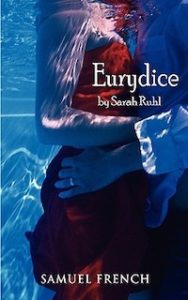 Eurydice by Sarah Ruhl
Eurydice by Sarah Ruhl
I love Sarah Ruhl’s plays. The story of Eurydice and Orpheus is romantic in a tragic way (my favorite kind of romance). Eurydice and Orpheus fall in love, but soon after their wedding Eurydice dies. Orpheus, in despair, travels to the Underworld to retrieve his lost love. Hades lets Orpheus take Eurydice, but warns him not to look at her until they’re out of the Underworld. A classic story retold from the perspective of Eurydice.
An Orchestra of Minorities by Chigozie Obioma
A retelling of the Odyssey. Chinonso and Ndali fall in love, but when Ndali’s parents object to Chinonso because he is not educated, he sells his possessions and leaves Ndali to go to school.
Everything Under by Daisy Johnson
On Twitter, Emily Wilson (first woman to translate The Odyssey) said this was one of her favorite classic myth retellings— I think that tells you all you need to know about this book. This is a retelling of Oedipus.
Virgin by Analicia Sotelo
Not exclusively a retelling, but many of the poems refer to the Ariadne myth. It’s a brilliant collection of poems.
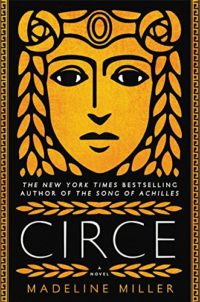 Circe by Madeline Miller
Circe by Madeline Miller
Okay, the book that got everyone jumping up and down about classical mythology (yeah, I am one of the super fans). I was hooked from the beginning. Circe, the nymph/witch who’s fascinated by humans. I would love Madeline Miller to write a book about Prometheus. I guess there might not be much to that story, but I find Prometheus fascinating.
*Salvage the Bones by Jesmyn Ward
In an interview with Powell’s, Ward spoke about incorporating classical mythology into her work: “The reason that I like to use classical myths as models is because African American writers and African American stories are usually understood as occurring in some kind of vacuum — because of slavery.” Later she said, “Yet, something that is so great about African American art is that we incorporate aspects of our lost African heritage with aspects of the various people in this country whom we’ve mixed with and encountered.” In both Sing, Unburied, Sing and Salvage the Bones there are allusions to the Medea myth.
The Song of Achilles by Madeline Miller
A love story between Achilles and Patroclus. This is a wonderful retelling of Achilles and the Trojan War told by the incomparable Madeline Miller.
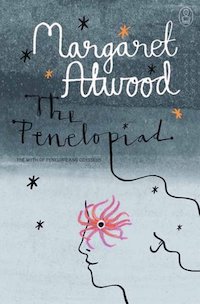 The Penelopiad by Margaret Atwood
The Penelopiad by Margaret Atwood
Penelope, dead, and in the Underworld recounts the twenty year absence of Odysseus. Plagued by a field of suitors vying for her hand and kingdom, Penelope has to keep their advances at bay as she awaits her husbands return from the Trojan War. And the best part, in between chapters, is the chorus of 12 hanged maids– called maids but really slaves– that were killed by Odysseus for crimes they never committed.
Home Fire by Kamila Shamsie
Home Fire is two stories entwined into one. First, there is the shadow of Antigone, the Ancient Greek play about the daughter/sister of Oedipus. Second, is the story of two Pakistani families’ assimilation into a world whose approval is constrained to the families’ ability to fit in. This is a story about identity. About faith and family.
Jason and Medeia by John Gardner
Jason decides he wants his kingdom back, so he asks his wife Medeia, the sorceress, to overthrow King Pelias. She does, and when she returns to Jason she discovers he’s taken a new wife in her absence…
Memoirs of Hadrian by Marguerite Yourcenar
Hadrian was a Roman emperor. In this story, Marguerite Yourcenar reimagines Hadrian’s life from boyhood to politics. It is written as a series of letters from Hadrian to his successor, Marcus Aurelius.
Food for the Gods by Karen Dudley
This is a story about Pelops, the King who was butchered and served in a feast to the gods. In this story Pelops is remade and becomes a celebrity chef. As his fame grows, the gods decide to help Pelops, which is really bad news for Pelops.
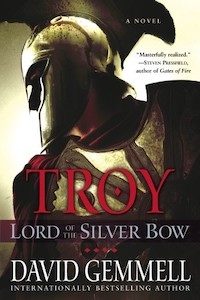 Lord of the Silver Bow by David Gemmell
Lord of the Silver Bow by David Gemmell
The most badass, amazing book! And it’s a first in a trilogy. This is the story of Aeneas, the forbearer of Romulus and Remus, the founders of Rome. In this story Aeneas is known as Helikaon and is an established hero. He is friends with Odysseus and a nephew to King Priam of Troy. The best character in this trilogy is Andromache, a priestess of Thera, and all- around- warrior goddess.
Till We Have Faces by C.S. Lewis
The story of Psyche and Cupid told through the eyes of Psyche’s sister Orual. The classic story: Cupid captures Psyche, puts her in his bed, rapes her (let’s call it rape), and then warns her to never look at his face. That’s not necessarily how the story goes in Lewis’s hands, but that’s the myth in a nutshell. This story focuses more on beauty and bitterness.
For the Most Beautiful by Emily Hauser
Like Margaret Atwood, Pat Barker, Madeline Miller, and Sarah Ruhl; Emily Hauser retells the Trojan War from the perspective of the women, who until recently, have been relegated to the background of the great epic stories.
I, Claudius by Robert Graves
It’s been a few years since I read this, but this I know: one of my all- time favorite books! I started reading Tiberius Claudius’ pseudo- memoir with the expectation of being bored, but that was dumb, because this was the best! Plus it was my introduction to Caligula…
The Labours of Hercules by Agatha Christie
Did you know Agatha Christie wrote a Hercule Poirit book based on the labors accomplished by Hercules? Me neither! But how thrilling?!
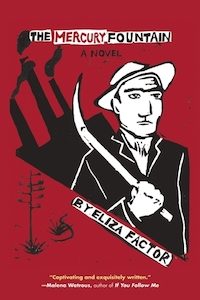 The Mercury Fountain by Eliza Factor
The Mercury Fountain by Eliza Factor
Innocently browsing the Akashic Books website one day I stumbled upon a book that promised to have a protagonist like Daniel- Day Lewis’ character in” There Will Be Blood”, the “noirish sensibilities” of Cormac McCarthy, and the “seductive language” of Gabriel Garcia Marquez. If that isn’t enough it also promises that the story takes its “cue from Mercury, the most slippery and mischievous of gods”. Yes, please.
Bestiary: Poems by Donika Kelly
With allusions to mythical beasts, this is a collection that captures feelings of love and identity. Mythology stays relevant because it helps us understand our own experience. A beautiful collection of poetry.
Oh My Gods by Alexandra Sheppard
A teenager’s life is complicated when she has to move in with her geeky dad who happens to be a Greek god.
Diverse Mythologies:
In an interview with Powell’s (which I quote from on this list) Jesmyn Ward says: “I think about slavery and entire cultures, people from those cultures, being robbed of their cultural traditions. Yet, something that is so great about African American art is that we incorporate aspects of our lost African heritage with aspects of the various people in this country whom we’ve mixed with and encountered.” I think this helps explain why there aren’t a large amount of Greco- Roman mythology retellings by authors of color. A few authors like Percival Everett, Kamila Shamsie, and Chigozie Obioma have all written retellings, but there are so many traditions of myth, legend, and folk tales from other cultures that deserve their own “must- read” list. I wanted to include a few of my favorites.
*Trail of Lightning by Rebecca Roanhorse
A climate change apocalypse story in which the Dinetah (homeland of the Navajo) has been remade, but now ancient monsters walk the earth. The monsters and supernatural elements in the book are based on Navajo folktales and myths (like Coyote!).
*Coyote Stories by Mourning Dove
Maybe the best- known story from American Indian myth, coyote is a trickster god that creates mayhem wherever he goes. This collection also includes stories about other animals and their origin. I’ve been interested in the Coyote myth since reading “Coyote America: A Natural and Supernatural History“. A wonderful book about the mystique and importance of coyotes in America.
 *Redemption in Indigo by Karen Lord
*Redemption in Indigo by Karen Lord
Inspired by a Sengegalese folk tale, this is the story of Paama who leaves her gluttonous husband, and is given a Chaos Stick by the djombi (undying ones). With the Chaos Stick she can remake aspects of the world, but an incensed djombi wants the power of the Chaos Stick for himself.
The Goddess Chronicle by Natsuo Kirino
Part of the Canongate Myths Series, this book retells the Japanese creation story of Izanami and Izanaki.
The Arabian Nights by Anonymous
Filled with tales of myth and legend, and told by Shahrazad for one thousand and one nights so she can delay her execution. A classic of medieval Islam.
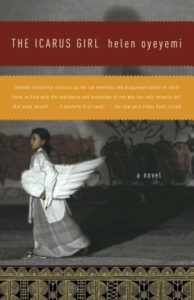 The Icarus Girl by Helen Oyeyemi
The Icarus Girl by Helen Oyeyemi
The title alludes to the Greek myth of Icarus and Daedalus. Daedalus made two sets of wax wings for himself and his son, but warned his son not to fly too high or too low. Of course Icarus flies towards the sun, his wings melt, and he plummets to his death. Oyeymi’s retelling is a Nigerian myth that draws on the theme of doubles.
When God Was a Woman by Merlin Stone
I quoted this book at the very beginning of this article, and saved it for last because it sums up so many feelings.
Need more? Try Books to Read if You Love Greek or Roman Mythology, or an interview with Madeline Miller!













